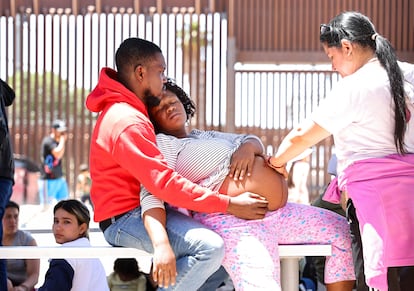Racism kills: Pregnant Black women are at higher risk of dying in the Americas
The United Nations Population Fund published a report that reveals how these women, rendered invisible in health systems, are more likely to die as a result of pregnancy and childbirth


In the Americas, being pregnant carries a greater health risk for a Black woman than a white woman. This, according to a recent report presented by the United Nations Population Fund (UNFPA), in which they analyzed and compared data from nine countries – Brazil, Colombia, Costa Rica, Cuba, Panama, Suriname, Trinidad and Tobago, the United States and Uruguay – to learn about the structural differences that exist when it comes to having a child.
The report, which analyzes five indicators, includes some alarming figures. For example, it reveals that in the United States, non-Hispanic African-American women and girls are three times more likely to die while pregnant or within 42 days of giving birth than non-Hispanic white women. Something which, moreover, is not related to education or opportunities, but with the structural racism that exists in healthcare services, as “maternal deaths among African American college graduates [are] 1.6 times higher than among white women with less than a high school diploma,” states the document.
The same scenario – albeit less drastic – can be seen in other countries, like Suriname and Colombia. In the former, the maternal mortality ratio for Afrodescendent women and girls is 2.5 times higher than that of non- Afrodescendent women and girls, while in the latter it is 1.6 times higher.
However, the problem goes beyond that. In the Americas, where the Latin America-Caribbean region has the second highest adolescent pregnancy rate in the world, Afrodescendent girls and teenagers are the most affected, with “the highest pregnancy rates in the region, alongside adolescent girls with lower educational attainment,” particularly in Panama, Suriname and Trinidad and Tobago.
“The factors influencing adolescent pregnancy and parenthood include high unemployment and low educational attainment,” states the report. “Racial and gender discrimination in employment and geographic isolation make this problem more acute for youth of African descent.”
Another of the indicators that show a vast disproportion between what happens to Black and white girls in the Americas has to do with the choice to plan or not. “Afrodescendent women and girls who are married or in a union are less likely to report that their family planning needs have been met,” warn the experts. This, of course, is linked to all the other findings, as not having access to structured family planning can lead to unwanted births or unsafe abortions and, therefore, maternal mortality.
“The scourge of racism continues for Black women and girls in the Americas, many of whom are the descendants of victims of slavery,” said UNFPA Executive Director Dr Natalia Kanem. “All too often, Afrodescendent women and girls are abused and mistreated, their needs are not taken seriously and their families are torn apart by the preventable death of a loved one during childbirth. Justice and equality will only be possible when our healthcare systems see these women and provide them with respectful and compassionate care.”
Lack of data
Although the report provides several figures, it also points out that there is a lack of data from health systems that fail to disaggregate the information by race or ethnicity. Although 90% of health plans prioritize the achievement of health equity, only one third of the 32 health plans surveyed for a 2019 Pan American Health Organization study identified Afrodescendants as a population that experiences barriers to health.
“It was difficult to do this research because the data is not there,” said Kanem. “And the world is not color blind, and it’s important that we say so. So one of our recommendations is to disaggregate health statistics by age, gender and location, as is usually done; but also by race and ethnicity, so that we can have a path towards a solution. We can’t change anything if we don’t see it. And data can save lives.”
In fact, UNFPA searched for data from 35 countries in the Americas, but was only able to find information in the nine countries that were used in the study, which reveals the lag that exists.
Sign up for our weekly newsletter to get more English-language news coverage from EL PAÍS USA Edition
Tu suscripción se está usando en otro dispositivo
¿Quieres añadir otro usuario a tu suscripción?
Si continúas leyendo en este dispositivo, no se podrá leer en el otro.
FlechaTu suscripción se está usando en otro dispositivo y solo puedes acceder a EL PAÍS desde un dispositivo a la vez.
Si quieres compartir tu cuenta, cambia tu suscripción a la modalidad Premium, así podrás añadir otro usuario. Cada uno accederá con su propia cuenta de email, lo que os permitirá personalizar vuestra experiencia en EL PAÍS.
¿Tienes una suscripción de empresa? Accede aquí para contratar más cuentas.
En el caso de no saber quién está usando tu cuenta, te recomendamos cambiar tu contraseña aquí.
Si decides continuar compartiendo tu cuenta, este mensaje se mostrará en tu dispositivo y en el de la otra persona que está usando tu cuenta de forma indefinida, afectando a tu experiencia de lectura. Puedes consultar aquí los términos y condiciones de la suscripción digital.








































